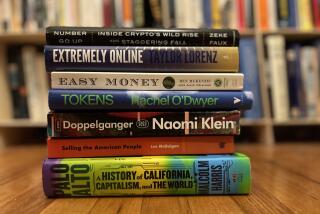‘Shake the World’ compiles success stories of young entrepreneurs
While the business establishment has spent the last three years gnawing at its fingernails, America’s entrepreneurial class, especially those young and gifted with technological skills, has been on a spree.
The cost of software development has plummeted, and vast new markets and communities can be accessed with the tools of social media. Entrepreneurship is anyone’s game these days, not just those experienced or connected enough to raise capital.
Add to that the disappearance of so many jobs and the rise in youth unemployment, and it is no wonder that young people are reassessing the meaning of work and the purpose of their education. James Marshall Reilly, a 29-year-old entrepreneur, is here to jolly them along, with stories of novel and self-directed lives from the heart of this new economy.
For anyone looking for a present for an anxious 21-year-old, Reilly’s book “Shake the World: It’s Not About Finding a Job, It’s about Creating a Life” is it. Just don’t be surprised if they then ditch their plans to take a job in accounting, head off to dig irrigation ditches in Haiti, tweet the results and apply for the next round of TED (technology, entertainment, design) fellowships.
Published by Portfolio, Reilly’s book talks to the “young game-changers” of this generation and seeks to discover how they found success. By game-changers, he means entrepreneurs, both business and social. There are no Young Turk investment bankers, politicians or cancer doctors in his book. These are people who design iPod covers, magazine publishers, serial technology entrepreneurs and the founders of innovative nonprofits. There is not a Rotary Club membership among them.
He starts by laying out the existential crisis besetting his generation: “We spend years preparing for college, tens or even hundreds of thousands of dollars attending school, and then we often send out resumes and apply for jobs that we hardly understand, at companies we know little about and take the first proposition offered. We don’t craft a life, but rather we take what we can get and then settle in and try to make it work.”
No more, says Reilly. Not when we have the examples of Jessica Jackley, the co-founder of Kiva, the microloan platform, or Shawn Fanning, founder of Napster, or Tony Hsieh of Zappos. Their lives and those of the others in his book show how young people with powerful ideas and strong wills can create entirely new kinds of organization.
Jackley tells Reilly of the vanishing line between nonprofit and for-profit groups, as she moves from raising microloans for the developing world’s poor, to a similar platform to raise funding for entrepreneurs in more established markets. “Social change,” she says, “can happen in almost any organizational structure.”
Reilly’s enthusiasm can go a little far at times. It is hard to stay with him as he rhapsodizes over Ido Leffler, the founder of Yes To, a company that makes beauty treatments out of vegetables and calls its customers “very important carrots.” In a chapter called “Cultivating the Twenty-First-Century Polymath,” he unblinkingly lets one subject describe himself as a “Possibility Accelerator — someone who has the ability to propel potentially brilliant concepts into action.”
But then again, dunking these ideas in worldliness is like telling a 6-year-old he cannot be an astronaut. Reilly is right to talk of the need continually to learn and reinvent oneself to keep up with the economy.
Reilly may sound breathless as he writes: “If we embrace capitalism not as a textbook economic theory, but as a tangible, accessible, leverageable and powerful tool available to everyone and anyone interested in starting a business to create sustainable and palpable change, we can become part of a movement that is branding social entrepreneurship and profit with purpose.”
But, really, after watching an older generation make such a mess of things, why not?
Broughton is a columnist for the Financial Times of London, in which this review first appeared, and he is the author of “Ahead of the Curve: Two Years at Harvard Business School.”
More to Read
Inside the business of entertainment
The Wide Shot brings you news, analysis and insights on everything from streaming wars to production — and what it all means for the future.
You may occasionally receive promotional content from the Los Angeles Times.










